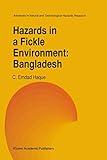Hazards in a fickle environment : bangladesh [Libro electrónico] / C. Emdad Haque
Por: Haque, C. Emdad [autor/a].
Tipo de material: Libro
en línea Editor: Dordrecht: Springer science, c1997Descripción: xv, 380 páginas : fotografías, gráf., mapas, retratos ; centímetros.ISBN: 940106167X; 9789401061674; 9789401151559 (Online).Nota de acceso: Disponible para usuarios de ECOSUR con su clave de acceso Nota de bibliografía: Incluye bibliografía: páginas 335-376 e índice: páginas 37-380 Número de sistema: 57542Resumen:
Libro
en línea Editor: Dordrecht: Springer science, c1997Descripción: xv, 380 páginas : fotografías, gráf., mapas, retratos ; centímetros.ISBN: 940106167X; 9789401061674; 9789401151559 (Online).Nota de acceso: Disponible para usuarios de ECOSUR con su clave de acceso Nota de bibliografía: Incluye bibliografía: páginas 335-376 e índice: páginas 37-380 Número de sistema: 57542Resumen:| Tipo de ítem | Biblioteca actual | Colección | Signatura | Estado | Fecha de vencimiento | Código de barras |
|---|---|---|---|---|---|---|
| Libros | Biblioteca Electrónica Recursos en línea (RE) | Acervo General | Recurso digital | ECO400575421638 |
Incluye bibliografía: páginas 335-376 e índice: páginas 37-380
Disponible para usuarios de ECOSUR con su clave de acceso
This book evolved from a collaborative research project between the University of Manitoba, Canada and Jahangirnagar University, Bangladesh, which commenced in 1984 to study the problems of river channel migration, rural population displacement and land relocation in Bangladesh. The study was sponsored by the International Development Research Center (IDRC), based in Ottawa, Canada. It was through this project that I started my journey into disaster research more than thirteen years ago with basically an applied problem of massive magnitude in Bangladesh. I spent two- and-a half-years, in two stages, in Bangladesh's riparian villages to collect the empirical data for this study. Then the growing disaster discourse throughout the 1980s, especially its conceptual and theoretical areas, drew me in further, gluing my interest to these issues. In the 1990s, during my research and teaching at Brandon University, Canada, I realized that, despite the large body of literature on natural disasters, there was no work that synthesized the approaches to nature-triggered disasters in a comprehensive form, with sufficient empirical substantiation. In addition, despite the great deal of attention given to disasters in Bangladesh, I found no detailed reference book on the topic. Natural hazards and disasters, in my view, should be studied under a holistic framework encompassing the natural environment, society and individuals. Overreaction to the limitations of technocratic-scientific approaches-the control and prevention of physical events through specialized knowledge and skills-has resulted in a call for "taking the naturalness out of natural disasters eng
Disponible en línea
Disponible en formato PDF
Subscripción a ELSEVIER 26 de diciembre del 2013
